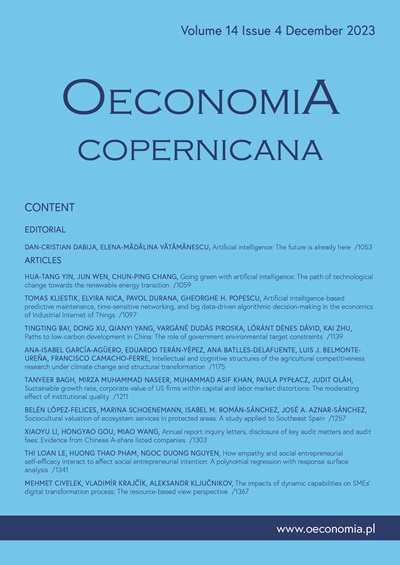维谢格拉德国家运输部门利润和收益管理的稳定性
IF 10.8
1区 经济学
Q1 ECONOMICS
引用次数: 13
摘要
研究背景:企业利润及其稳定发展是关键绩效指标。许多企业根据当前的业务和宏观经济形势以及时间进行盈利操纵,无论是向上还是向下。这些活动可能会中断时间序列的平稳性。本文主要研究的是运输企业,以及债券在其收益中的评估。文章的目的:文章的目标是确定2010年期间V4中每个国家运输企业息税折旧摊销前利润中非平稳的发生情况及其单位根源?方法:基于470名斯洛伐克人、405名捷克人、774名波兰人和1056名匈牙利人的样本,通过Kwiatkowski、Phillips、Schmidt和Shin检验以及增广Dickey Fuller检验时间序列的平稳性和单位根。修正的Jones模型表明了盈余操纵行为(非平稳性的第一个原因)。回归分析证实了非平稳性的其他原因,包括GDP、失业率、月平均总工资和经商便利指数等因素。调查结果和附加值:V4地区每个国家的息税折旧摊销前利润时间序列的非平稳性已披露。盈余管理被发现是这种不稳定发展的原因。因此,当局和审计师的增值是显示非平稳会计和创造性会计之间的关联。此外,运输部门有目的地向下操纵,而不是向上操纵,这是一般情况下的典型情况。研究中使用的方法可在新兴国家跨部门应用。根据国家对具体的宏观经济变量贴上标签,使企业有机会关注对其生存和活动具有关键影响的因素。本文章由计算机程序翻译,如有差异,请以英文原文为准。
Stability of profits and earnings management in the transport sector of Visegrad countries
Research background: Business profit and its stable development are key performance indicators. Many enterprises performed earnings manipulation, either upward or downward, according to the current business and macroeconomic situation, as well as time. These activities may interrupt the stationarity of time series. This article focuses on the transport enterprises, and the assessment of bonds in their earnings.
Purpose of the article: The target of the article was to identify the occurrence of non-stationary and its unit root in the EBITDA of transport enterprises for each country in V4 during the period of 2010?2019.
Methods: The stationarity and unit roots in time series were tested by the Kwiatkowski, Phillips, Schmidt, and Shin tests and the Augmented Dickey-Fuller based on the samples of 470 Slovak, 405 Czech, 774 Polish, and 1,056 Hungarian. The behavior of earnings manipulation (the first cause of non-stationarity) was indicated by the Modified Jones model. Additional causes for non-stationarity were confirmed by the regression analysis, including factors such as the GDP, unemployment rate, average monthly gross wage, and the Ease of doing business index.
Findings & value added: The non-stationarity in the time series of EBITDA was disclosed for each country in the V4 region. Earnings management was discovered to be the cause of this erratic development. Thus, the value-added for the authorities and auditors is to show the association between non-stationary and creative accounting. In addition, purposeful downward manipulation in the transport sector occurs, not upward, which is typical in general. The methodology used in the study may be applied cross-sectorally in emerging countries. The labelling of specific macroeconomic variables depending on the country offers enterprises the opportunity to focus on factors with a crucial influence on their existence and activities.
求助全文
通过发布文献求助,成功后即可免费获取论文全文。
去求助
来源期刊

Oeconomia Copernicana
ECONOMICS-
CiteScore
13.70
自引率
5.90%
发文量
26
审稿时长
24 weeks
期刊介绍:
The Oeconomia Copernicana is an academic quarterly journal aimed at academicians, economic policymakers, and students studying finance, accounting, management, and economics. It publishes academic articles on contemporary issues in economics, finance, banking, accounting, and management from various research perspectives. The journal's mission is to publish advanced theoretical and empirical research that contributes to the development of these disciplines and has practical relevance. The journal encourages the use of various research methods, including falsification of conventional understanding, theory building through inductive or qualitative research, first empirical testing of theories, meta-analysis with theoretical implications, constructive replication, and a combination of qualitative, quantitative, field, laboratory, and meta-analytic approaches. While the journal prioritizes comprehensive manuscripts that include methodological-based theoretical and empirical research with implications for policymaking, it also welcomes submissions focused solely on theory or methodology.
 求助内容:
求助内容: 应助结果提醒方式:
应助结果提醒方式:


